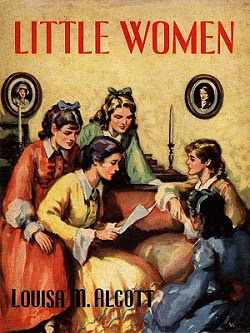
I’d been avoiding “Little Women” by Louisa May Alcott ever since I had a portion of it in school since I hated school and everything associated with it. It’s odd isn’t it? Presumably the intent of the syllabus writers was to expose us to famous works and it ended up doing the opposite! In any case, I finally rid myself of the inhibition and picked it up. I’m glad I did.
I have conflicting opinions about this book. On the one hand, it has some potentially very powerful feminine characters with Jo being the shining example. She’s independent, doesn’t subscribe to norms of masculinity and femininity, she writes, and doesn’t care about speaking her mind. Her sisters accept her for who she is and her sole aim in life isn’t to get married.
On the other hand, Alcott clearly shoves some moralizing down our throats about what a woman’s place in society is, how she should always be self sacrificing and do her “duty” etc. For a book that is hailed as an example of feminism in those times, it’s pretty damn gender biased. Now I know, I know. I’m supposed to view it in the context of that time when women didn’t even have the right to vote etc etc. But I feel myself singularly lacking in sympathy nevertheless. I’m not able to go beyond the stereotypes of women that this book propagates. I can only imagine the state of the other books in the same period!
Another problem I have is with cardboard cut out characters. I’m way too old to believe black and white people who are all too good and sugary. This was the main peeve I had with Bleak House and I find some of the same traits here. Mrs. March is the perfect specimen of motherhood with no flaws whatsoever, infinitely wise and all knowing, guiding her daughters with an unseen hand. The children never rebel, and treat her like a goddess. The same applies to Beth who is so angelic and pure that she’s literally too good for this world and has to be put down. Incidentally, she never seemed to have been “sullied” by any sexual encounters whatsoever.
The ending was so perfect and full of bliss that I had to force down the last few pages. Jo gets married after all and realizes her duty to her parents instead of going off and living the independent life she always wanted. She’s learned the “beauty of sacrifice”. The whole family seems curiously happy about Beth being dead by imagining her always present and “in a better place”. Incidentally the idea of god itself and paradise is taken for granted and not worthy of even being questioned.
For a book that is cited as breaking a lot of conventions, Little Women sure manages to retain almost all the major ones. Marriage? Check. Children? Check. Purity of virginity? Check. God? Check. Duty? Check. And to think it started off in such a promising manner. I was entirely captivated by the first half of the book – a magnificent work. And with so much promise, it just manages to go off the rails as it becomes one boring cliche after another.
Thankfully the characters themselves are quite interesting when they’re not being morally superior. Jo, Laurie, and Amy are the stand out stars of the show and it was really only to learn what happens to them, did I continue on. Otherwise, Mrs. March, Beth, Mr. March and the rest could have vanished entirely and I wouldn’t have cared.
I had saved a copy to give to Tejaswee to read when she was older – I read it first when she was a baby. I have always wanted to read it again, to see how much my outlook has changed and I do remember finding it too, and directly, preachy. And I have no doubt that if I get to reading it again, my reactions would be the same as yours.
In reply to Indian Homemaker
I was surprised because it’s usually help up as a symbol of women’s empowerment. For it’s time it was maybe. I certainly enjoyed the style of writing and its humor.
Meh…..reading about White women in olden times? Had enough of that thanks. :P :P